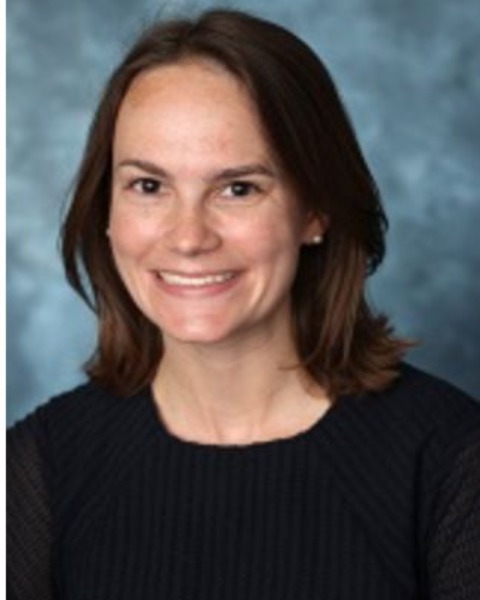Medical Education: Resident
Category: Abstract Submission
Medical Education 14 - Medical Education: Resident V
271 - Challenging Communication: Implementation and Assessment of a Curriculum for Pediatric Residents
Monday, April 25, 2022
3:30 PM - 6:00 PM US MT
Poster Number: 271
Publication Number: 271.420
Publication Number: 271.420
Ann Prybylowski, Ann & Robert H. Lurie Children's Hospital of Chicago, Chicago, IL, United States; Lucas Bruton, Ann & Robert H. Lurie Children's Hospital of Chicago, Chicago, IL, United States; Natalia Henner, Ann & Robert H. Lurie Children’s Hospital of Chicago, Chicago, IL, United States; Katie K. Wolfe, Washington University in St. Louis School of Medicine, Saint Louis, MO, United States

Ann Prybylowski, MD
Fellow
Ann & Robert H. Lurie Children's Hospital of Chicago
Chicago, Illinois, United States
Presenting Author(s)
Background: Residents are spending less time in direct patient care in the era of more restrictive work hour limits and the COVID-19 pandemic. This has a negative impact on learning opportunities, including training in communication, with few physicians feeling adequately prepared to deliver difficult news by the end of training. Delivery of difficult news curricula for pediatric residents typically only focus on life-altering news and rarely are longitudinal, timely, or objectively assessed.
Objective: We developed a longitudinal, rotation-integrated simulation and case-based curriculum for PL-2 pediatric residents focused on developing skills for communication of difficult news evaluated with an objective structured clinical examination (OSCE).
Design/Methods: We utilized Kern’s Model of Curriculum Development to (1) complete an initial needs assessment of graduating pediatric residents in a single large pediatric residency program; (2) develop a multi-faceted difficult news curriculum including lectures, case discussions, and simulated scenarios during PL-2 clinical rotations; and (3) design and implement an assessment OSCE on delivery of difficult news, scored using the Modified Breaking Bad News Assessment Scale (m-BAS). Subjective differences in residents’ comfort with difficult conversations were evaluated using a pre- and post-curriculum survey, using paired t-tests. Objective m-BAS scores on the OSCE will be compared pre- and post-curriculum implementation and differences will be assessed using two-sample t-tests.
Results: The needs assessment was completed by 50% of residents, with 54% of responding residents reporting feeling comfortable or very comfortable with breaking bad news to families. Both the pre- and post-curriculum surveys were completed by 50% of residents. Prior to curriculum implementation, most participating PL-2 residents had little comfort with delivery of difficult news. Following implementation of the curriculum, resident comfort scores increased significantly for breaking bad news, de-escalation, providing an appropriate amount of information, eliciting parental expectations, and providing closure at the end of the conversation. These results are summarized in Figure 1. Data collection for post-implementation OSCE performance is ongoing and will be complete by April 2022 and then compared with m-BAS scores from 2021.Conclusion(s): Implementation of a multi-faceted communication curriculum for pediatric residents improves resident comfort in interaction with families in challenging situations.
Resume January 2022.pdf
Objective: We developed a longitudinal, rotation-integrated simulation and case-based curriculum for PL-2 pediatric residents focused on developing skills for communication of difficult news evaluated with an objective structured clinical examination (OSCE).
Design/Methods: We utilized Kern’s Model of Curriculum Development to (1) complete an initial needs assessment of graduating pediatric residents in a single large pediatric residency program; (2) develop a multi-faceted difficult news curriculum including lectures, case discussions, and simulated scenarios during PL-2 clinical rotations; and (3) design and implement an assessment OSCE on delivery of difficult news, scored using the Modified Breaking Bad News Assessment Scale (m-BAS). Subjective differences in residents’ comfort with difficult conversations were evaluated using a pre- and post-curriculum survey, using paired t-tests. Objective m-BAS scores on the OSCE will be compared pre- and post-curriculum implementation and differences will be assessed using two-sample t-tests.
Results: The needs assessment was completed by 50% of residents, with 54% of responding residents reporting feeling comfortable or very comfortable with breaking bad news to families. Both the pre- and post-curriculum surveys were completed by 50% of residents. Prior to curriculum implementation, most participating PL-2 residents had little comfort with delivery of difficult news. Following implementation of the curriculum, resident comfort scores increased significantly for breaking bad news, de-escalation, providing an appropriate amount of information, eliciting parental expectations, and providing closure at the end of the conversation. These results are summarized in Figure 1. Data collection for post-implementation OSCE performance is ongoing and will be complete by April 2022 and then compared with m-BAS scores from 2021.Conclusion(s): Implementation of a multi-faceted communication curriculum for pediatric residents improves resident comfort in interaction with families in challenging situations.
Resume January 2022.pdf
